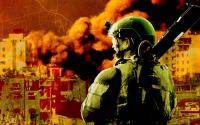26 September 2004Times OnlineMark Franchetti, Grozny
After surviving nearly a decade of savage, seemingly interminable warfare in Chechnya without seeing any of her four children come to harm, Khalimat Saidullayeva thought the worst was over.
She started to believe the Kremlin’s claims that life in the breakaway republic would return to normal, and somehow clung to her optimism about the future even after her flat was burnt down two months ago in a gun battle between Russians and Chechen rebels.
Saidullayeva, 37, had never had any connection with the rebels, but someone in her home town of Argun, 15 miles from Grozny, the Chechen capital, spread a malicious rumour that they had paid her £25,000 in compensation for the loss of her property.
It was a highly improbable claim in a region where the average monthly salary is £100. Russian commanders appear to have given it credence, however, with devastating consequences for Saidullayeva and her children, the youngest a boy of eight.
The Russians came for her at 5am on September 12, nine days after the bloody end to the Beslan school siege in neighbouring North Ossetia, in which up to 400 people were killed, half of them children.
At least 15 heavily armed members of the Russian special forces wearing camouflage and masks surrounded her parents’ house, where she was staying with her children. They threatened the family at gunpoint and started searching the rooms.
Familiar with stories of Chechen men disappearing in the middle of the night, Saidullayeva apparently assumed at first that the Russians were after her 28-year-old brother.
Instead, they handcuffed her and forced her into the back of a car. She has not been seen or heard of since.
“We pleaded with them not to take her away. We were all crying, terrified,” said her mother Tamara, 60, a former member of the Chechen parliament, who was hit with the butt of a Kalashnikov when she tried to stop the Russians.
“We have been looking for her everywhere but have no idea of what happened to her. She has simply vanished. We don’t know who to turn to and pray day and night she is still alive.”
Far from being an isolated victim, Saidullayeva was one of a growing number of targets in Moscow’s campaign against the veiled “black widows” of Chechnya — female suicide bombers who have killed more than 200 people in four years.
During the past five weeks alone, three black widows — many of whom have lost husbands among Chechen fighters killed by the Russians — murdered 100 civilians by blowing up two planes and setting off a bomb outside a Moscow metro station.
Two women with explosives belts were also among the terrorists who took more than 1,200 people hostage in Beslan’s middle school No 1. Russian forces in Chechnya have responded by hunting down women they suspect of being possible suicide bombers. About 100 women have vanished across the republic since the Moscow theatre siege in October 2002 when 41 Chechen rebels — including 18 female suicide bombers — took more than 800 people hostage.
Only a handful of the missing women have returned and most are feared dead. The bodies of about a dozen have been found, dumped in shallow, roadside graves. They bore signs of torture and mutilation, and appear to have been executed.
None of the women detained by the Russians has been charged or put on trial and their families still do not know why or where they were taken. Most, like Saidullayeva, had no known links with the rebels.
“First hundreds of young Chechen men vanished in the night in this fashion,” said one human rights activist. “Now, since the appearance of female suicide bombers, it’s women who are disappearing.”
Most were seized by Russian-speaking armed men in front of relatives or other witnesses. Of the few who have returned, none has explained what happened to them. Some, like Zulekhan Khadjiyeva, are so traumatised that they are unable to speak.
A petite 19-year-old from Grozny, Khadjiyeva vanished on a snowy afternoon last December. Witnesses saw her and her 21-year-old cousin, Aslan, pushed into a van by armed men in camouflage in Grozny’s central market.
Her family searched in vain and had given up hope when, eight months after her disappearance, she was found wandering aimlessly, barefooted, near the spot where she had last been seen. Her legs and thighs bore numerous injection marks and her spine was damaged.
Khadiyeva has not uttered a word since returning home except for “yes” and “no”. She is unable to sleep for more than two hours at a time and is scared by the presence of any man — indicating she may have been abused in captivity.
“I couldn’t believe my eyes when I saw her again,” said her mother, Alina. “She doesn’t act like a human being any more.”
A month before the Beslan atrocity, the bodies of three young women who had vanished in mysterious circumstances were found in a shallow grave on the outskirts of Grozny. One was Madina Mejayeva, a 20-year-old student who disappeared on July 15 after travelling from her village to the capital.
Her corpse had multiple stab wounds and her face had been mutilated to render indentification more difficult. A witness claims to have seen three men in uniform abduct her.
The abductions undermine the impression of a gradual resumption of normal life in Chechnya. In Grozny, which suffered Europe’s heaviest bombardment since the second world war, 200,000 people are now living among ruins. By day the markets and streets are teeming. Electricity and gas have been restored and there is no large-scale fighting.
But although £1.2 billion is said to have been spent on reconstruction, not a single apartment block destroyed during two wars with the Russians has been rebuilt.
Contrary to claims by the Kremlin that it has all but defeated the rebels, 250 fighters entered the city centre unhindered only a month before the attack on Beslan and set up road blocks as they hunted for Chechens working with security forces loyal to Moscow. Seventy people were shot at point blank range in the space of a few hours.
Last week the Russians were firing heavy artillery rounds into the mountains where the rebels are hiding and several villages were sealed off.
There is no sign that Shamil Basayev, who claimed responsibility for the Beslan siege and is seen as the main force behind the black widows, is running out of recruits.
Last week the Russians were questioning Medina Musayeva, a 15-year-old girl from Shali, 20 miles south of Grozny, who vanished after leaving a note in which she vowed to become a suicide bomber. She was allegedly recruited by a woman now in custody.
Musayeva is believed to have spent four days being trained by the rebels, athough the staged manner of her confession on television has raised suspicions that she was framed.
“Why the Russians think abducting and killing women should bring an end to the terror is beyond my comprehension,” said a Chechen aid worker. “It will only make more people willing to blow themselves up.”






